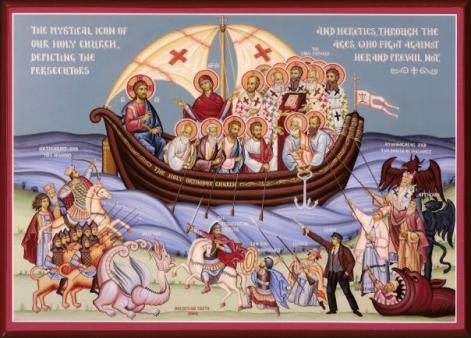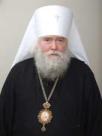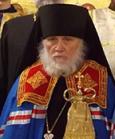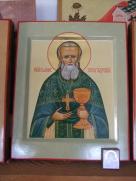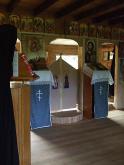Monday, September 1, 2014
Why get married?
Why does the Holy Church place such importance on marriage?
It does so because marriage is a recipe for happiness in a sorrowful, fallen world:
Being connected by the ties of marriage we substitute for each other both hands and ears and legs. Marriage makes a weak one twice stronger, gives great joy to well-wishers and grief to ill-wishers. The common cares of the spouses make their griefs easier; common joys are more delightful for both of them. For the unanimous spouses riches are more pleasant, and in scarcity unanimity itself is more pleasant for them than riches. The ties of marriage serve them as the key to chastity and desire, as the seal of necessary affection. They drink from one source of their home, from which strangers do not drink and which flows nowhere and from nowhere. Being one flesh they have also one soul and with mutual love they equally motivate each other to be diligent to please God. Because marriage does not remove from God, but on the contrary it ties more to Him, because it has more motivations for it.
Saint Gregory the Theologian (4th century)
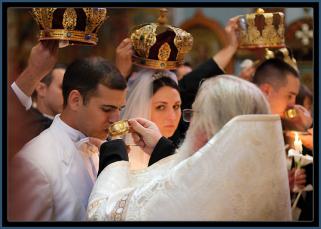 Is the great Mystery of marriage still relevant today?
Is the great Mystery of marriage still relevant today?
Society tells us it is not - claiming that living de-facto is “just as good”, and that “there is no hurry to marry”, indeed “what’s all the fuss about?”
The Holy Church has a different view. It sees marriage as a path to the Kingdom of Heaven. A path that is exalted, sober, and profound - completely different to secular, unbelieving modern life.
Surprisingly, even from a secular perspective, marriage appears advantageous, especially when a couple has children. Although the couple themselves may feel their love is firm and beautiful, it is illegal by God’s law…In essence, the couple are saying to God: “We don’t need You! We have enough with each other! What we have is beautiful, and You have no place with us. We do not require your blessing.”
Under the conditions of modern life, filled with vulgarity and moral decadence, a person must learn how to guard his spiritual health and develop an “antidote” against all kinds of fornication. Bishop Alexander of Mileant: Celibacy, Marriage or “free love”… Which way to choose?
A conscientious adult Orthodox Christian is obliged to be fruitful and committed through marriage, if he has not chosen to serve God as a monastic. For centuries, indeed, ever since the fall of Adam, the world is attacking God-pleasing practice mainly through the temptation of lust and lawlessness. We must be aware of this warfare, and prepare our response.
For an Orthodox Christian, the Sacrament of Marriage is all that is necessary to make the union of man and woman blessed before God. The wedding feast typically celebrated after the service is the optional part of getting married! Celebrations do not contribute in any way to the happiness or validity of the marriage… Not infrequently throughout the ages, couples found that no celebration were practically possible. This happened in times of war, poverty, famine, persecutions, or political unrest. Often the party celebration was completely omitted, to no detriment to the marriage (or the bank account!).
Ironically, today, many spend $50000-100000 on this non-essential part of the marriage, often postponing the crucial part (the solemn Mystery) indefinitely due to financial constraints! All the while, the poor couple often continues to sin before God, harming their potentially blessed and happy marriage relationship, and allowing their children to grow up in an atmosphere of sin…
If we are not willing to live according to the strict, but loving standards of the Church on this key point - then how can we claim to be Orthodox Christians?
Thursday, August 21, 2014
From the Philokalia on FASTING
Suppose you have ordered yourself not to eat fish: you will find that the enemy continually makes you long to eat it. You are filled with an uncontrollable desire for the thing that is forbidden. In this way you can see how Adam’s fall typifies what happens to all of us. Because he was told not to eat from a particular tree, he felt irresistibly attracted to the one thing that was forbidden for him.
St John of Karpathos (7th century)
Those pursuing the spiritual way should train themselves to hate all uncontrolled desires until this hatred becomes habitual. With regard to self-control in eating, we must never feel loathing for any kind of food, for to do so is abominable and utterly demonic. It is emphatically not because any kind of food is bad in itself that we refrain from it. But by not eating too much or too richly we can to some extent keep in check the excitable parts of our body. In addition we can give to the poor what remains over, for this is the mark of sincere love.
Fasting, while of value in itself, is not something to boast of in front of God, for it is simply a tool for training those who desire self-restraint. The ascetic should not feel proud because he fasts; but with faith in God he should think only of reaching his goal. For no artist ever boasts that his accomplishment is simply due to his tools; but he waits for the work itself to give proof of his skill.
St Didachos of Photiki (5th century)
Wednesday, August 13, 2014
Dormition fast
Today starts the fast preparing Orthodox Christians for the Dormition of the Mother of God.
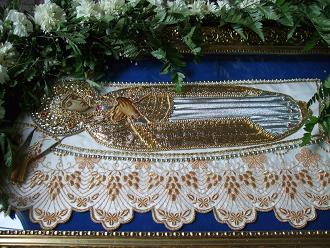 This fast is not long, but it is quite strict. Fish is only allowed on the Great Feast of the Transfiguration (this year, Tuesday 19th August), and wine and oil are only allowed on Saturdays and Sundays, until the 28th of August, the Dormition of the Most-Holy Mother of God.
This fast is not long, but it is quite strict. Fish is only allowed on the Great Feast of the Transfiguration (this year, Tuesday 19th August), and wine and oil are only allowed on Saturdays and Sundays, until the 28th of August, the Dormition of the Most-Holy Mother of God.
Fasting is indispensable for Orthodox Christians. The Holy Church teaches that since Adam’s fall, body and soul in man are disordered. Man has become fleshly, and cannot sense or understand spiritual reality as intended by the Creator. But the Church provides us with a path towards God!
Fasting I call the eating of a little bit once a day. Getting up from the table when one is still hungry, having his food, bread, and salt, and his drink-water, which the springs themselves bring forth. Behold the royal way of receiving food; that is, many have been saved by this path, so the Holy Fathers have said.
St Paisius Velichkovsky, 18th Cent.
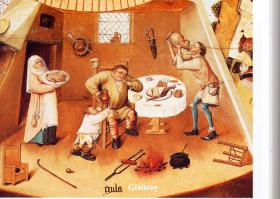 The Church prescribes us a simple medicine to remedy the imbalance of our fallen nature, and bring us closer to God again: fasting. If we are willing to fast for the sake of our bodies (i.e. diet), then we should be much more willing to do this for our soul! This is why Orthodox Christians abstain from meat, fish, and even oil during the fast. They also keep themselves carefully from every sin and bad habit, any excesses and entertainment. It is not unheard of that married couples abstain from sexual relations, and many families turn off the television completely in these two weeks. Most importantly: More time and attention is devoted to prayer in church and in the home.
The Church prescribes us a simple medicine to remedy the imbalance of our fallen nature, and bring us closer to God again: fasting. If we are willing to fast for the sake of our bodies (i.e. diet), then we should be much more willing to do this for our soul! This is why Orthodox Christians abstain from meat, fish, and even oil during the fast. They also keep themselves carefully from every sin and bad habit, any excesses and entertainment. It is not unheard of that married couples abstain from sexual relations, and many families turn off the television completely in these two weeks. Most importantly: More time and attention is devoted to prayer in church and in the home.
One of the most important [reasons for fasting is]: self–control. Every day we are inundated with thousands of messages, either visual or audible or both, which beckon, cajole, or beguile us to indulge ourselves in one form of excess or another. Statistical research has shown that we listen to these messages and act upon them. The average twentieth–century American enjoys a standard of living which was once reserved to high–placed aristocracy. In the heat of August, even a hundred servants with hand–held fans could not do for Louis XIV what a simple room air conditioner does for a retired widow in a small apartment in our time. What would Julius Cæsar have given for a chariot capable of traveling over sixty miles per hour, which could cover hundreds of miles in a single day? The luxury and comfort we enjoy tends to smother spiritual life even as the thorns choked out the seed in our Lord’s parable. Thus, to train ourselves in denial and self–control, to learn the art of gracefully declining a simple piece of cheese on an inappropriate day, is one of the more valuable lessons the Church can offer us.
A Guide to Orthodox Life, by Father David and Presbytera Julianna Cownie
Sunday, August 10, 2014
Odigitria Icon of the Most-Holy Mother of God
Reverence for the Mother of God and reverence for icons painted of Her and the Saints keeps Orthodox Christians safe from several of the early heresies.
Naturally, we must all learn much more about our holy Orthodox faith than this simple reverence. However, without this reverence, we will lose Orthodoxy completely…! Simple reverence is not at all contradictory to profound theological knowledge, as some modern people mistakenly assert. However, each Christian must grow to deepen this reverence, learning from Holy Scripture, the Lives of Saints, the writings of the Holy Fathers of the Church, the liturgical services of the Church (such as today’s service, for the 28th of July - the Hodigitria (Smolensk) Icon of the Mother of God).
Finally, a Christian also learns from his own relationship to the Mother of God, seeing how She has helped him in his own life. Why is this “personal lesson” last? This is because our personal experiences and thoughts always are in danger of containing some element of temptation from the evil one.
A conscientious Orthodox Christian discusses his ideas regarding the Mother of God and assistance from the saints with his father confessor. Learning from his spiritual father, humbly revealing his ideas, thoughts, and even emotions, he can remain safe from another great danger - that of self-deception and delusion. The Mystery of Confession provides a setting for a faithful person to learn in this individual manner, assisted by the grace of God and the priest as a witness.
The Church is a spiritual school. Its program of study is primarily the liturgical services, which are rich in dogmatic theology. The services satisfy the intellectual aspect of a person and encourages growth in wonder before the greatness of God. The Church also guides and nourishes a person through the Mysteries - for the greater part of our life, the great nourishing mysteries are Confession, Holy Communion and Marriage.
Paradoxically, if a person chooses to not continue his spiritual learning within the walls of the school of the Church, simple reverence without spiritual knowledge can even lead him away from God….! He may not even notice this himself. This is why the fathers have stated: “Whoever does not have the Church as a Mother, cannot have God as his Father!”
Monday, August 4, 2014
From the Philokalia on THOUGHTS
Both mental converse with evil thoughts and external encounters and chatter alike darken the soul. If we are not to injure the intellect, we must not spare either of these chatterboxes, whether they be our own thoughts or other people. And we must not spare them for a most cogent reason: because otherwise our intellect will be darkened and we will lose our watchfulness. If we are darkened by forgetfulness, we destroy the intellect.
St Hesychios the Priest, 8th Cent.
Now what am I to say about the demon who makes the soul obtuse? For I am afraid to write about him: how, at his approach, the soul departs from its own proper state and strips itself of reverence and the fear of God, no longer regarding sin as sin, or wickedness as wickedness; it looks on judgement and the eternal punishment of hell as mere words; it laughs at the fire which causes the earth to tremble; and, while supposedly confessing God, it has no understanding of His commandments. You may beat your breast as such a soul draws near to sin, but it takes no notice. You recite from the Scripture, yet it is wholly indifferent and will not hear. You point out its shame and disgrace among men, and it ignores you, like a pig that closes its eyes and charges through a fence. This demon gets into the soul by way of long-continuing thoughts of self-esteem; and unless “those days are shortened, no flesh will be saved”(Mt. 24:22).
Evagrius the Solitary, 4th Cent.
According to the Fathers, if our inner self is watchful it can protect the outer self. But we and the demons combine in committing sins. The demons work through evil thoughts alone by forming in the intellect what fanciful pictures they wish; while we sin both inwardly through evil thoughts and outwardly through our actions. Lacking the density of physical bodies, the demons through deceitfulness and guile are purveyors of torment, both to themselves and to us, by means of evil thoughts alone. If they did not lack the density of physical bodies, they would always be sinning through outward actions as well, for their will is always disposed to ungodliness.
St Hesychios the Priest
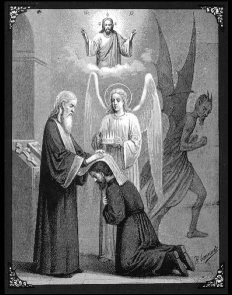 Thoughts are one way demons access our nature. We sin very much through our thoughts. Every outward sinful deed starts with a thought. Words and deeds proceed from thoughts.
Thoughts are one way demons access our nature. We sin very much through our thoughts. Every outward sinful deed starts with a thought. Words and deeds proceed from thoughts.
How ironic that modern man, investigating and claiming to know much about the physical world, has lost understanding of who instigates his own evil thoughts! He has lost the understanding that it is not obligatory to accept evil thoughts! Evil thoughts are not our own, unless we willingly accept them, or at any rate, do not reject them fully, but entertain them in our mind. No - according to the Holy Fathers of the Orthodox Church, evil thoughts are the work of our enemies, the evil spirits!
How sober and truly wise a Christian must be, to not be fooled by evil!
This is why it is so important to confess not only deeds, but also thoughts and inclinations…Confession is the main weapon of a Christian against the evil demons, whose aim is to deceive and lead all people away from God. Confession is one of the Mysteries of the Church, without which a person cannot be saved!
We need to confess often and regularly; and it is compulsory each time we are preparing to receive Holy Communion, which we should also partake of often and regularly. In our evil times, it is good practice for us Christians to do this every time we go to Church.
Sunday, July 27, 2014
Sermon on the Sunday of the first Six Ecumenical Councils
ORTHODOXY means “right glorification” (of God), correct faith. The correct faith, as defined by the Holy Church - that faith defines how we believe.
The essence of Orthodoxy is NOT things like having gold cupolas, having an iconostasis, having no church seats…! These things are part of Church tradition, and may assist our faith, but they have had various forms in various times and places.
The correct faith was defined at the seven Ecumenical Councils. These gatherings of Bishops discussed and condemned certain teachings which were disturbing Christians at various times in history. These non-Orthodox teachings are called heresies. A heresy is an ERROR in faith, or an incorrect teaching.
These Ecumenical Councils defined the basics tenets (called dogmas) of the Orthodox faith.
In addition to the Councils, the Orthodox faith is informed by the Holy Scriptures (the Bible) and the Church Tradition as taught and lived by the Holy Fathers of the Church.
1. In the 4th century, 300 bishops met and refuted Heresy of Arius against the Son of God.
The Arians believed that Son of God is created, that is, that he is a man and not truly God. They believed that Jesus Christ is NOT equal with God the Father.
It is interesting to note that many modern protestants see Jesus Christ in a similar way to the Arians – as a great moral teacher, a good man, or their personal friend. The manner of addressing God is coloured by this perception of Christ as “one of us, a man”.
Many later Christian Groups, such as MORMONS, the “Church of God”, and Jehovas Witnesses, hold more or less Arian views of our Lord Jesus Christ.
We Orthodox, in contrast, believe that Jesus Christ truly is God AND man.
2. Once again, in the 4th century, 150 bishops met and refuted the heresy of Macedonius against God the Holy Spirit.
The Macedonians believed that the Holy Spirit is NOT equal with God the Father.
This council also reaffirmed the Creed of Faith, which Orthodox Christians recite every day.
It is interesting to note that many years later, the Roman Catholic church changed the Creed of Faith precisely in its explanation of the Holy Spirit. Instead of teaching that the Holy Spirit proceeds from the Father, the Roman Catholic church teaches that the Holy Spirit proceeds from the Father AND the Son – in essence, making the Holy Spirit lower than the Father and the Son.
In contrast, we Orthodox believe that the Holy Spirit is equal with the Father and the Son.
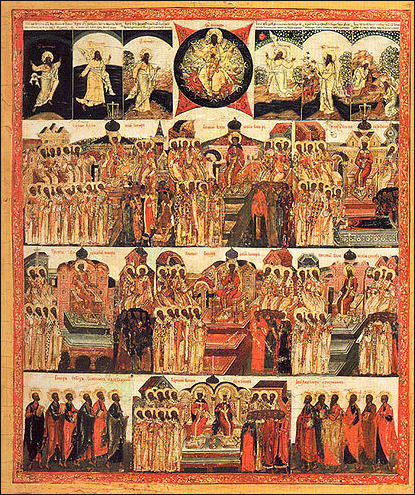
3. In the 5th century, 200 bishops met and refuted the heresy of Nestorius against the Mother of God.
The Nestorians believed that the Holy Virgin Mary should not be called “Theotokos”, but rather, only “Christotokos” – that is, birthgiver of Christ, but not of God. This teaching makes it unclear whether Jesus Christ, from the moment of conception, really was God!
From the beginning of the protestant faiths, they have been reluctant to give the honour of the name “Birthgiver of God” to the Most-Holy Virgin. Many protestants do not believe that the Virgin Mary remained a Virgin before, during, and after childbirth.
In contrast, the Orthodox faith teaches that the Most-Holy Virgin is holier than all the saints, because she fully contained within Herself and gave birth to – GOD the SON!
4. In the 5th century, 600 bishops refuted the monophysite heresy.
The monophysites believed Christ had only ONE nature – the DIVINE nature. They believed His human nature was absorbed in His Divine nature.
To this days, the Coptic “Orthodox”, Syrian “Orthodox”, and Armenian “Orthodox” have not renounced this belief.
The Orthodox believe that Christ had two natures, both Divine and human – otherwise, it would follow that the divine nature suffered on the Cross – something which is not possible for the unchangeable God.
5. In the 6th century, 160 bishops refuted the heresy of Origen.
This belief holds that ‘everyone is saved’ or ultimate universal salvation, regardless of faith and life. It is a very MODERN VIEW of faith, which we encounter every day in the modern society we live in.
The Orthodox faith is very different from this modern indifference – it requires a specific faith, and a specific practice, and sincere repentance wherever a person falls short of the ideal
6. In the 7th century, 170 bishops refuted the monothelite heresy.
The monothelites believed that Christ had ONLY one will - the Divine Will (NOT 2 wills as in Orthodoxy). The famous Saint MAXIMOS the Confessor suffered much, and finally had his tongue cut out because of his stance against this heresy. St Maximos was a simple monk, who taught the correct faith, acting against Emperors, Patriarchs, and Bishops who had accepted the non-Orthodox belief. As he was not even a priest, but only a simple monk, he is an example of what courage, firmness, and knowledge every lay person should have in keeping the Orthodox faith.
7. In the 8th century, 360 bishops met and refuted iconoclasm.
The iconoclasts believed we should not make icons of Christ, the Mother of God, or the saints. This heresy disturbed the Church from more than a hundred years. There were martyrs for the icons, icons were destroyed, and the whole Byzantine empire was implicated.
ALL these Heresies produced thousands of martyrs. Orthodox faithful were killed for refusing to accept these new distorted and altered forms of faith. To this day the TRUE Orthodox Church believes that these Church Councils, through the operation of the Holy Spirit condemned and judged these Heresies, and the ORTHODOX FAITH was defined and confirmed for all time.
YOU are not Orthodox unless you believe according to the Holy Ecumenical Councils. But this is not all – you must also make sure your Bishop believes according to the Seven Ecumenical Councils. This is because the BISHOP is the head of the local Church. How the Bishop BELIEVES is how the Church BELIEVES.
According to the LAWS (the Canons) of the 7 Ecumenical Councils:
1. An Orthodox Christian cannot leave his bishop….EXCEPT if the Bishop is in heresy.
2. An Orthodox MUST, or is obliged to leave his Bishop if he is in heresy.
On this basis people like us left ROCOR(MP) in 2007 when it joined the Moscow Patriarchate (MP), because this organisation fully participates in the World Council of Churches (WCC), and through it, in ECUMENISM – a teaching which has been defined by Church fathers as heresy of heresies.
All the ‘mainstream’ Orthodox bishops who participate in the WCC, and the Churches they represent, do not truly follow the decisions, Canons, ands Laws of the seven Ecumenical Councils. They have signed documents to be ONE with the very heretics condemned by these Councils!
For example, well-known bishops (even patriarchs!) publicly pray with not only Monophysites and Catholics, but also with pagans and Jews. Prayer together with people who believe entirely differently is not allowed for Orthodox people. Therefore, such hierarchs have put themselves outside the Orthodox Church - and no sincere Christian can follow them.
Roman Catholics recognise another 20 Councils as Ecumenical. One of their most recent councils teaches that the Pope of Rome, when he speaks ‘ex cathedra’ is sinless. As mentioned above, they also changed the Symbol of Faith from the 2nd Ecumenical Council.
Protestants and later Christian Sects descended from the Protestants do not acknowledge ANY Ecumenical Councils. This is interesting because the composition of books in Holy Scripture (which they regard as their sole source of authority) was finally decided only in the 6 Century, at the 6th Ecumenical Council (!)
Many of the Heresies of the first Centuries were widespread, lasted a long time, and caused tremendous disruption in Church and political life, with great loss of innocent life. ‘Everyone’ was a heretic. The vast majority of people were in the glorious big churches. The true Orthodox were suffering, persecuted and often tortured and killed, by people who a short while before attended the same church as them!!
The True Orthodox had to gather in Catacombs, and make-do churches anywhere they could.
There is nothing new about the majority being in heresy, and this majority persecuting the few faithful people.
In our times what is most dangerous for us is the entry of Orthodox Churches into the ecumenical movement. This means their acceptance of a Protestant ecumenical understanding of the Church. Such an understanding in reality is already spoken of at meetings and printed in the books of Orthodox ecumenists. Together with the breakdown of an authentic Orthodox understanding of the Church we find an undermining of the meaning of the Ecumenical Councils which means a consequent loss in the firmness of the Council’s dogmas. As a result, the very foundation of Orthodoxy is undermined. ( Protopresbyter Michael Pomazansky. From Orthodox Life, No.1, 1989.)
However, we must understand that the heretic, non-Orthodox Christians are not necessarily “bad people” – but they are not Orthodox. They are not in God’s Church.
We should pray for them and feel sorry for them – bring them to Orthodoxy, by our example faith and life. Those who have left the Orthodox Church, or who entertain non-Orthodox teachings while still outwardly appearing to be “orthodox” are the poorest of the poor – for they have lost their salvation through the Holy Orthodox Church!
Dear brothers and sisters…..we must RUN to the MOTHER OF GOD for help, as the Orthodox Christians always have done.
She will protect, guide and help us. She is our help and Protectress.
Incorrect belief and distortion of Orthodox faith (as defined by the seven Ecumenical Councils), is a spiritual sickness. People who have stopped running to the Mother of God for guidance and help …..eventually end up in incorrect belief, or even no belief or faith. Some even start persecuting the true faith.
Let us pray especially for the younger generations, our children, and their children who will need even more help to survive in our increasingly antichristian world. Amen.
